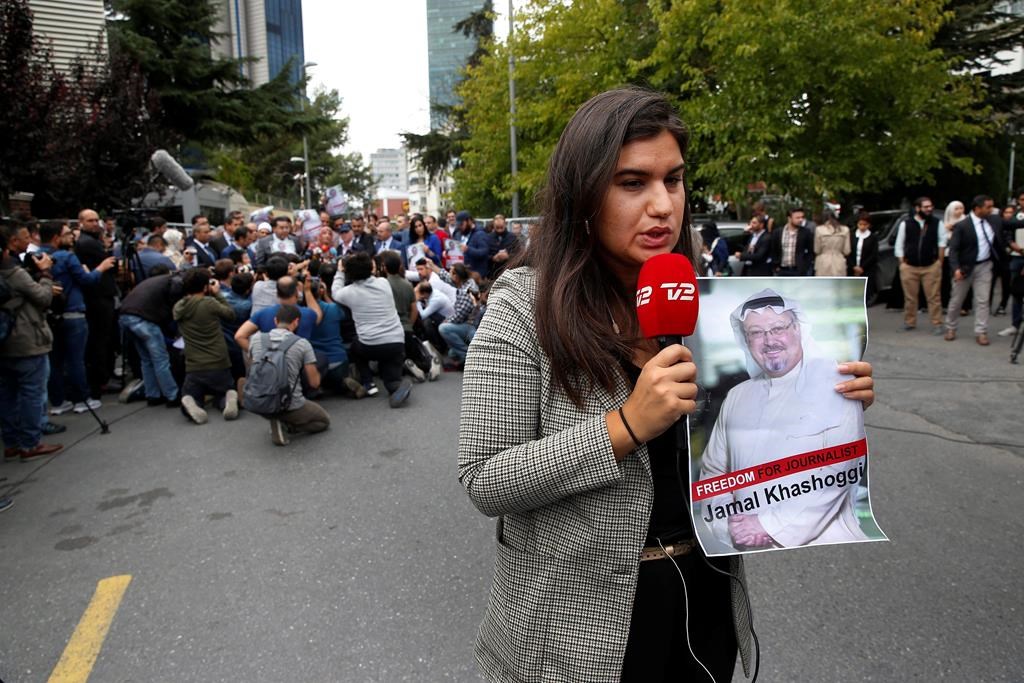It was a rather awkward time for a renewed line of criticism of Canada’s approach to human rights in Saudi Arabia given that the events of the past week have demonstrated the need for a sense of urgency when it comes to addressing the matter.

Whether the now-infamous Aug. 3 tweet from Global Affairs Canada was badly worded seems like a rather trivial matter in the face of the disturbing details that have emerged about the gruesome fate of Washington Post contributor Jamal Khashoggi.
The details published this week by the Post are horrific. According to Turkish government officials, audio and video recordings exist of Khashoggi being tortured, killed, and then dismembered inside the Saudi Consulate in Istanbul. If these reports are confirmed, they warrant a swift and meaningful response from Canada and other western nations.
Given the spat that ensued between Canada and the Saudis, however, there may not be much of an appetite in Ottawa for renewed diplomatic hostilities. But if we’re going to remain silent on the apparent murder of a journalist, then shame on us.
WATCH: How a Saudi dissident vanished in plain sight

I wouldn’t suggest that former ambassador to Saudi Arabia Dennis Horak is ambivalent about the fate of Khashoggi, but this would seem to be the Saudi-related matter demanding the greater attention at the moment as opposed to a rehashing of the events of August.
In an interview this week, Horak – who was expelled from Saudi Arabia in August – suggested that Canada “made mistakes” in its dealings with the Kingdom. “It was a situation that didn’t need to occur,” he said, “… to sort of yell from the sidelines I don’t think is effective.”
Horak did at least admit that the Saudi response to that tweet was a “serious over-reaction,” which it clearly was. Holding the Saudis accountable for what happened to Khashoggi might prompt yet another “over-reaction,” but if it does then so be it.
When asked about all of this yesterday, Prime Minister Justin Trudeau responded that, “This particular case is of course of concern and we join with our allies around the world in expressing serious issues with these reports. Obviously, there’s a lot more to uncover on what happened here.”
He was also pressed on the more sensitive matter of the government’s deal with the Saudis to supply the Kingdom with armoured vehicles. Trudeau noted that, “the previous government signed a contract with Saudi Arabia to sell armoured vehicles … we respected that contract but at the same time brought in significantly new and strengthened measures around transparency, around accountability in ensuring … we are making sure Canadians’ expectations and laws are always being followed.”
WATCH: Trudeau comments on Saudi journalist’s disappearance, says keeping armoured vehicle contract

It was a delicate tap-dance around the larger question of what it might take for us to sever any of these lucrative ties with the Saudis.
Obviously, there are a lot of jobs in southwest Ontario connected to the production and sale of these armoured vehicles. But if the Saudis believe that having economic leverage over us gives them a blank cheque when it comes to the brutal suppression of dissenting voices at what point does all of that take a back seat to human rights?
These economic concerns also appear to be weighing heavily on the mind of the U.S. president. Donald Trump expressed his own concern about the situation, but added: “I don’t like the concept of stopping an investment of $110 billion into the United States.” (A likely exaggeration of the amount of the U.S.-Saudi trade relationship). Trump may even have his own personal conflicts here, given his previous business dealing with the Saudis.
WATCH: Trump says he has no intention of halting $110 billion Saudi arms deal

Trump, though, did say Friday that he intends on raising the matter with the Saudi king, which is a positive step. There is also a bipartisan push in the U.S. Senate to invoke the Magnitsky Act, which could see sanctions against Saudi officials if they are found to be responsible for Khashoggi’s death.
Canada has its own version of the Magnitsky Act — the Justice for Victims of Corrupt Foreign Officials Act. We, too, should be prepared to use it.
If a tweet was enough to provoke the Saudis, it’s possible that this could really set them off. But that cannot and should not deter us. This is about what’s right, not what’s convenient.
WATCH: ‘We can’t let this happen’: Trump speaks to disappearance of Saudi journalist

Rob Breakenridge is host of “Afternoons with Rob Breakenridge” on Global News Radio 770 Calgary and a commentator for Global News.
- Life in the forest: How Stanley Park’s longest resident survived a changing landscape
- ‘Love at first sight’: Snow leopard at Toronto Zoo pregnant for 1st time
- Carbon rebate labelling in bank deposits fuelling confusion, minister says
- Buzz kill? Gen Z less interested in coffee than older Canadians, survey shows




Comments